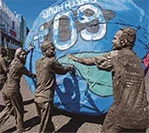FOLLOWING the peace accord between the Free Aceh Movement (GAM, Gerakan Aceh Merdeka) and the Indonesian government in 2005, and the passing of the No. 11 Law of 2006 on the governance of Aceh, the northern Sumatran province of Aceh has been set on the path of autonomy, making it one of the most unique provinces in all of Indonesia today.
Adding to the uniqueness of Aceh is that it is the only province that also has local parties contesting at the national election, numbering three in all: Partai Aceh (PA), Partai Nasional Aceh (PNA) and Partai Damai Aceh (PDA).
Over the past two months the elections in Aceh were the only ones which registered instances of violence, including harassment, intimidation, beatings and even killings. And today, as the final votes are being tallied, a number of parties that have contested have refused to accept the results. The ruling PA party seems to have registered a drop in support, but remains the dominant one at provincial government level.
All eyes are on Aceh now, for there are also other areas and provinces in Indonesia that have talked about special provincial status, and the success or failure of Aceh may well determine the future shape that Indonesia will take in the decades to come.
But securing autonomy and making it work is not an easy thing to do.
As Kamaruddin Abubakar, head of the Perusahan Daerah Pembangunan Aceh (PDPA) said to me, “there is the need to balance the economic wants of the people, and to bring in development at the same time”.
Aceh’s local government has been accused of damaging the environment for the sake of projects like oil palm plantations and mining, but Kamaruddin noted the need to create jobs to bring about peace in a province that has been in a state of civil conflict for decades.
“Up to the tsunami disaster there was no development because much of Aceh was closed off due to the fighting. Now we need to give the ex-GAM militants a chance to earn a living, and to bring normality back to Aceh, too.”
The memorandum of 2005 explicitly noted the need to integrate the thousands of members of the GAM militia back into normal society, and to provide them with jobs, land, and educational opportunities so that they can lay down their arms and live in relative peace.
Then there has been the controversy over Aceh’s syariah code and religious laws. Kamaruddin, himself an ex-GAM commander and former guerilla, was clear on the matter of syariah and hudud in Aceh.
“We cannot implement such laws unless people understand and are educated first. What is the point of cutting off a man’s hand for stealing, if that means that he cannot work afterwards?” he asked.
“Today we live in an age of human rights, economic rights, and universal covenants. So laws must adapt to these realities and also take them into account –we need to ensure that laws reflect present-day concerns about economic independence, right to livelihood and educational opportunities.”
Similar concerns were raised by the governor of Aceh himself, Zaini Abdullah, who noted that Aceh’s autonomy record has been patchy so far. But while the local PA government in Aceh has been beset by concerns and criticism, he also noted that half of the responsibility goes to the Indonesian government, too
“When we (GAM) signed the MoU with the Indonesian government in 2005, the government was expected to live up to its commitments and obligations as well. If these commitments are not met, then the people will rise up and protest all over again.”
Aceh now has access to 70 per cent of the oil, gas and other revenues from the province, and has control over its own resources. This makes it very attractive to foreign as well as local developers.
Its geo-strategic location at the mouth of the Straits of Malacca also means that Aceh is important in the context of regional geo-politics. But with many of the parties (thus far) refusing to accept the results of this year’s elections, it is clear that Aceh remains a work-in-progress.
Between the need to open itself up to investment for further development and the need to preserve its Acehnese-Muslim culture and identity, Aceh is in some ways a microcosm of Indonesia today, that faces similar competing demands at the same time.
Article by Dr Farish Noor which appeared in New Straits Times, 28 April 2014.





